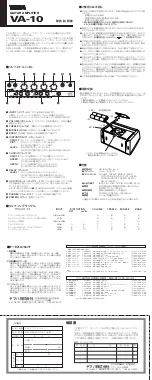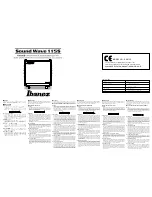
All operating elements and connections
described can be found on page 2.
1 Operating Elements
and Connections
1
Input MIC 1 (XLR jack) with a 24 V phantom
power for connecting a microphone to input
channel 1 [as an alternative to the jack (7) on
the rear side]
2
Reading light
3
Switch for the reading light (2 brightness lev-
els)
4
Input MIC 2 (XLR jack) with a 24 V phantom
power for connecting a microphone to input
channel 2 [as an alternative to the jack on the
rear side]
5
VOLUME control, for each input channel 1 – 4
6
LED RF; will light up when a radio signal is
received at input channel 1
The signal from a wireless microphone will be
mixed to the signal at the input of channel 1.
The LED RF at input channel 2 has no func-
tion.
7
Combined XLR / 6.3 mm jack for connecting a
microphone via an XLR plug or a signal
source with line level via a two-pole 6.3 mm
plug for each input channel 1 – 3.
The XLR contacts of the input channels 1 and
2 are supplied with a 24 V phantom power,
e. g. for electret microphones.
8
Equalizer controls HIGH, MID an LOW for
each channel 1 – 3
9
RCA inputs AUDIO IN for connecting a signal
source with line level to input channel 4;
when both jacks are connected (e. g. stereo
signal from a CD player), the signals will
create the sum (mono)
10
Output LINE OUT, REC (RCA jacks) to route
the mixed signal, e. g. to a recorder or
another amplifier system
11
LED LIMITER; will light up when the input
level is too high and is reduced by the limiter
12
POWER LED
13
POWER switch
14
Mains jack for connection to a socket (230 V~ /
50 Hz) via the mains cable provided
15
Support for the mains fuse
Always replace a blown fuse by one of the
same type!
16
Castors
17
Compartment; e. g. for pens or an audio
recorder or audio player
18
Shelves; e. g. for scipts
/
notes and this in
-
struction manual
19
Storage compartment; e. g. for connection
cables
2 Safety Notes
This unit corresponds to all relevant directives of
the EU and is therefore marked with
.
Please observe the following items in any case:
G
The unit is suitable for indoor use only. Protect
it against dripping water and splash water,
high air humidity and heat (admissible ambi-
ent temperature range 0 – 40 °C).
G
Do not operate the unit and immediately dis-
connect the mains plug from the socket
1. if the unit or the mains cable is visibly dam-
aged,
2. if a defect might have occurred after the unit
was dropped or suffered a similar accident,
3. if malfunctions occur.
In any case the unit must be repaired by
skilled personnel.
G
Never pull the mains cable to disconnect the
mains plug from the socket, always seize the
plug.
G
For cleaning only use a dry, soft cloth; never
use water or chemicals.
G
No guarantee claims for the unit and no liabil-
ity for any resulting personal damage or mate-
rial damage will be accepted if the unit is used
for other purposes than originally intended, if it
is not correctly connected or operated, or if it
is not repaired in an expert way.
G
Important for U. K. Customers!
The wires in this mains lead are coloured in
accordance with the following code:
green/yellow = earth
blue = neutral
brown = live
As the colours of the wires in the mains lead of
this appliance may not correspond with the
coloured markings identifying the terminals in
your plug, proceed as follows:
1. The wire which is coloured green and yellow
must be connected to the terminal in the
plug which is marked with the letter E or by
the earth symbol , or coloured green or
green and yellow.
2. The wire which is coloured blue must be
connected to the terminal which is marked
with the letter N or coloured black.
3. The wire which is coloured brown must be
connected to the terminal which is marked
with the letter L or coloured red.
Warning – This appliance must be earthed.
3 Applications
The lectern SPEECH-200 consists of a high-
quality 2-way speaker system, a mixing amplifier
with four input channels and a receiving part for
a wireless microphone with a carrier frequency
of 863.05 MHz. It is ideally suited to reproduce
sound, e. g. for lectures, speeches, readings, etc.
The optional wireless microphone offers addi-
tional mobility (e. g. for passing round the micro-
phone in the audience when questions arise).
Besides three microphones, it will also be
possible to connect other audio units (e. g. CD
player for adding music). Via the jacks LINE
OUT, REC, the output signal will be routed to a
recorder or to another amplifier system. The inte-
grated reading light offers two brightness levels.
The two integrated castors on the rear side
of the lectern allow convenient transport.
4 Transport and Setting up
For transporting the lectern, seize the top part
and tilt it slightly backwards so that it will stand
on its two castors only. Thus, it will be easy to
wheel it to the place of application. Set up the
lectern is such a way that the speakers on its
front side will be directed towards the audience.
5 Connections
Prior to connecting any units or to changing any
existing connections, switch off the amplifier sys-
tem and all units to be connected.
5.1 Microphones and audio unit
1) Connect a
microphone
(e. g. a suitable
gooseneck microphone from the EMG…P
series) to one of the XLR jacks (1 or 4) on the
upper side of the lectern and adjust it to the
person speaking. It will also be possible to
equip both jacks with one microphone each.
The jacks have a latching; to disconnect the
plug, press the PUSH lever.
As an alternative, connect a microphone
with an XLR plug to the input jack (7) of the
channels 1 and 2 on the rear side of the
lectern. Like the jacks on the upper side of the
lectern, these microphone inputs will supply
the phantom power (24 V ) required by some
microphones.
The input jack of channel 3 allows connec-
tion of another microphone with XLR plug.
2) To connect a
signal source with line level
(e. g. mixer, CD player), use the 6.3 mm jacks
(7) of the input channels 1 – 3 (if the corre-
sponding channel is not reserved by a micro-
phone) or the RCA jacks AUDIO IN (9) of
channel 4. When both RCA jacks are con-
nected (e. g. stereo signal from a CD player),
the signals will create the sum (mono).
Note:
If you use a wireless microphone, its sig-
nal will be mixed to the input signal of channel 1.
5.2 Recorder or
additional amplifier system
The RCA jacks of the output LINE OUT, REC
(10) allow connection of a recorder or another
audio unit with line input (e. g. an additional
amplifier system for PA applications in large
zones). The mixed signal of the audio sources
will be available at these jacks.
5.3 Power supply
Connect the power supply cable provided to the
mains jack (14) and the mains plug to a socket
(230 V~ / 50 Hz).
6 Operation
1) Before switching on, set the VOLUME con-
trols (5) of all four input channels to “0” to pre-
vent switching noise and an excessive vol-
ume.
2) Switch on the audio sources connected first,
then switch on the SPEECH-200 with the
POWER switch (13). The POWER LED (12)
will light up. If an additional amplifier system
for PA applications has been connected to
If the unit is to be put out of operation
definitively, take it to a local recycling
plant for a disposal which will not be
harmful to the environment.
WARNING
The unit uses dangerous mains
voltage. Leave servicing to skilled
personnel only. Inexpert handling
or modification of the unit may
result in electric shock.
6
GB
Summary of Contents for SPEECH-200
Page 2: ...2...


























